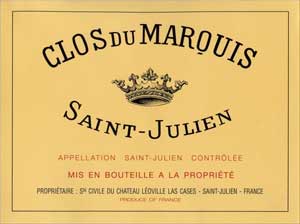| Region | |
|---|---|
| Subregion | France > Bordeaux > Left Bank > St Julien |
| Colour | Red |
| Type | Still |

Now positioned as a totally separate vineyard and a real clos (enclosed walled vineyard), this blend of 70% Cabernet Sauvignon, 20% Merlot and the rest Cabernet Franc and Petit Verdot from Jean-Hubert Delon is a beauty. Creme de cassis notes intermixed with some vanillin, crushed rock and spring flowers jump from the glass. Full-bodied and powerful (nearly 14% natural alcohol), this is a generously endowed, rich wine that was first made in 1902. The 2009 should drink well for 20-25 years. Readers need to think of it as a true classified growth, although technically it is not.
Raspberry and wild currant on the nose. Full-bodied, with superfine tannins and a long, pretty finish. Plenty of currant and mineral character. Builds on the finish. Tannic.
Medium to deep garnet colored, the 2009 Clos du Marquis gives up notes of warm cassis, mocha, plum preserves and tobacco with a touch of Mediterranean herbs. Medium to full-bodied, the palate is solidly structured with firm, chewy tannins backing up the muscular fruit core, culminating in a mineral-laced finish. 2019 - 2026
Black red, smoky nose with deep, rather discreet fruit, great purity, quite reserved, extremely elegant. Drink 2014-20.
Rich yet firmly structured this is a very classic St.-Julien that's generous and polished with so much energy driving the long plush finish. Delicious now, but should hold for many years. (Horizontal Tasting, London, 2019)
Clos du Marquis is being positioned by Jean-Hubert Delon as a separate single vineyard wine rather than Leoville Las Cases' second wine. The logic is simple. It has come from the same vineyard for over twenty years, and is not a true second wine in the sense that it is not made from Las Cases' discarded cuvees. The 2009 Clos du Marquis (70% Cabernet Sauvignon, 20% Merlot, and the rest Cabernet Franc and Petit Verdot) came in at 13.75% alcohol. It exhibits a deep ruby/purple hue along with sweet notes of creme de cassis, great purity, a full-bodied mouthfeel, and terrific texture as well as length. It should evolve for 20-25 years. (Tasted once.) Dirnk 2010-2035.
Tasted at Chateau Leoville Las-Cases. The Clos du Marquis 2009 has a wonderful vibrant, floral bouquet packed full of crushed violets, a touch of cassis, blueberry and blackberry jam all with fine definition. Opulent and ravishing. The palate has a silky smooth entry, very fine velvety tannins that belie that tannic backbone underneath. This is a serious Saint Julien with great persistency on the finish. Superb. Tasted November 2011.
Tasted at the château. A blend of 70% Cabernet Sauvignon, 20% Merlot, 8% Cabernet Franc and 2% Petit Verdot with 7.6% vin de presse, delivering 13.75% alcohol and a pH of 3.70. The Clos du Marquis has a sexy, quite opulent and very pure bouquet with lascivious red-berried fruits, vanilla, blueberry and a touch of cedar. The palate has a seamless entry, very focused and beautifully balanced, glides across that palate, filigree tannins, sensuous and silky towards the finish. Very alluring, but perhaps just missing a little delineation and edginess towards the finish. Still, this Clos du Marquis is as impressive as usual. Tasted March 2010.